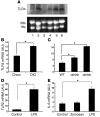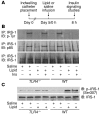TLR4 links innate immunity and fatty acid-induced insulin resistance
- PMID: 17053832
- PMCID: PMC1616196
- DOI: 10.1172/JCI28898
TLR4 links innate immunity and fatty acid-induced insulin resistance
Abstract
TLR4 is the receptor for LPS and plays a critical role in innate immunity. Stimulation of TLR4 activates proinflammatory pathways and induces cytokine expression in a variety of cell types. Inflammatory pathways are activated in tissues of obese animals and humans and play an important role in obesity-associated insulin resistance. Here we show that nutritional fatty acids, whose circulating levels are often increased in obesity, activate TLR4 signaling in adipocytes and macrophages and that the capacity of fatty acids to induce inflammatory signaling in adipose cells or tissue and macrophages is blunted in the absence of TLR4. Moreover, mice lacking TLR4 are substantially protected from the ability of systemic lipid infusion to (a) suppress insulin signaling in muscle and (b) reduce insulin-mediated changes in systemic glucose metabolism. Finally, female C57BL/6 mice lacking TLR4 have increased obesity but are partially protected against high fat diet-induced insulin resistance, possibly due to reduced inflammatory gene expression in liver and fat. Taken together, these data suggest that TLR4 is a molecular link among nutrition, lipids, and inflammation and that the innate immune system participates in the regulation of energy balance and insulin resistance in response to changes in the nutritional environment.
Figures








Comment in
-
Obesity and inflammation: III.Curr Gastroenterol Rep. 2007 Aug;9(4):307-8. Curr Gastroenterol Rep. 2007. PMID: 17883979 No abstract available.
References
-
- Yamauchi T., et al. The fat-derived hormone adiponectin reverses insulin resistance associated with both lipoatrophy and obesity. Nat. Med. 2001;7:941–946. - PubMed
-
- Steppan C.M., et al. The hormone resistin links obesity to diabetes. Nature. 2001;409:307–312. - PubMed
-
- Yang Q., et al. Serum retinol binding protein 4 contributes to insulin resistance in obesity and type 2 diabetes. Nature. 2005;436:356–362. - PubMed
Publication types
MeSH terms
Substances
Grants and funding
LinkOut - more resources
Full Text Sources
Other Literature Sources
Medical
Molecular Biology Databases

